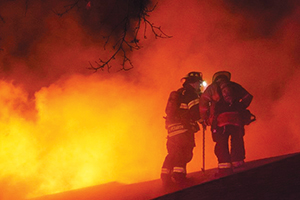By BETSY TAYLOR
Maggie Ward, like many people, thought of firefighters as "one of the healthiest groups of people" because she knew they had to be physically fit to respond to emergencies and put out fires while encumbered with heavy gear.
While research indicates that fitness and exercise may protect against certain cancers, Ward knows that no one is invincible. She coordinates cancer outreach and the risk assessment program for three of Ascension’s Via Christi Health hospitals in Wichita, Kan., — Via Christi Hospital St. Francis, Via Christi Hospital St. Joseph and Via Christi Hospital St. Teresa. And, when she was contacted last year by firefighters forming a Kansas chapter of the Firefighter Cancer Support Network, Ward soon learned more about the cancer risks firefighters face. She agreed to get involved in the group's outreach and screening promotion efforts.

Wichita firefighters wear self-contained breathing apparatus while battling a blaze. The Firefighter Cancer Support Network encourages wearing the equipment in both active and post-fire environments to limit potential exposure to carcinogens.
Photo courtesy of the Wichita Fire Department
The nonprofit network educates the firefighting and emergency medical services communities about cancer prevention, early detection and treatment options. The network also provides assistance to these emergency responders and their families after cancer diagnoses.
In 2013, a study led by researchers from the National Institute for Occupational Safety and Health found that 30,000 firefighters followed from 1950 through 2009 from Chicago, Philadelphia and San Francisco had "small to moderate increases in risk for several cancer sites and for all cancers combined" with higher rates of respiratory, digestive and urinary system cancers accounting for most of the higher rates of cancer seen in that study population.
A 2013 Firefighter Cancer Support Network paper, in contrast to the NIOSH study, said firefighters "may have a lower incidence of lung cancer in some studies than the general population." It said this may be due to restrictions on the use of tobacco products among firefighters and increased use of their self-contained breathing apparatus for protection when fighting fires.
"Today's residential fires have more in common with hazmat events than old-fashioned house fires due to the materials now common in homes such as plastics and synthetics," according to the Firefighter Cancer Support Network paper. "Commercial and vehicle fires have highly concentrated toxicants and dumpster fires contain completely unknown substances and toxicants."
The Firefighter Cancer Support Network educates firefighters about cancer prevention, including the distribution of a tip sheet about steps firefighters can take from the start of the fire through their return to a fire station or home to protect themselves from exposure to carcinogens.
Wichita Fire Marshal Brad Crisp said fire departments in the Wichita area, like many others in the country, have stepped up education in recent years to encourage firefighters to wear their breathing apparatus not just when a fire is being brought under control, but also afterwards, when carcinogens may still be present in the air, he said. Firefighters also are encouraged to quickly clean off after fighting a fire, to change out of dirty gear and not wear it home.
Ward said while firefighters are at some increased risk for several types of cancer, she and members of the Kansas chapter of the Firefighter Cancer Support Network decided to focus on one of those cancers, colorectal cancer. Through the partnership between the Firefighter Cancer Support Network and Via Christi, Ward has met this year with command staff from five fire departments to talk about cancer prevention and screenings. The command staff have distributed fecal occult blood screening kits to their employees along with educational materials about colorectal cancer prevention. Via Christi is providing the colon cancer screening kits and lab testing free of charge.
If blood is identified in the sample at the lab, Ward coordinates medical follow-up for the fire department employee, she said. (Blood in the stool is a symptom of colorectal cancer, but not all blood in the stool is caused by cancer.)
Ward expects the partnership between the firefighters and the health care system to continue with more education and with data collection for a longitudinal study of cancer rates among Wichita firefighters.
Copyright © 2015 by the Catholic Health Association
of the United States
For reprint permission, contact Betty Crosby or call (314) 253-3477.